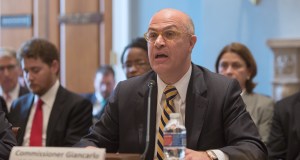Big banks join UBS on blockchain plan

Three of the world’s largest banks have joined with UBS in its plan to use blockchain to document and secure interbank settlements, underlining the transformative potential of the new encrypted distributed ledger technology.
The new “Utility Settlement Coin,” or USC, uses the blockchain technology that underlies bitcoin, but USC is a digital cash equivalent of each of the major currencies used for interbank settlements like the dollar or euro — not a new decentralized digital currency.
The Financial Times reported Wednesday that Deutsche Bank, Santander and BNY Mellon, as well as the broker ICAP, have now signed on to UBS’ plans — first hatched last fall with London-based startup Clearmatics.
Blockchain is a technology using encryption and distributed computing power to create a constantly upgraded and cryptographically secure record of transactions — distributed among all its participants.
Boosters see opportunities to cut red tape and back office operations by introducing a software-based (rather than human-operated) instantaneous and cryptographically guaranteed record of interbank payments and other money movements.
International payments are expensive and time-consuming to execute, Rob Morgan, vice president for emerging technologies at the American Bankers Association told FedScoop. “The business case for any new technology is where there’s the greatest potential for a return on investment,” he said. Where there are multiple parties to a transaction, as in any international payments system, “Each party has their own record of the transaction” and it can take “days and days” to reach a final settlement.
With blockchain, all parties are essentially agreeing to a single record of the transaction in near-realtime.
The total cost to the finance industry of clearing and settling trades is estimated at as much as $80 billion a year, the FT states, citing figures last year compiled by Oliver Wyman.
“The conversation today is about how can we use blockchain to more efficiently complete payments within the existing system,” said Morgan.
“The current settlement machinery is incredibly antiquated, inefficient and balkanized … The longer the settlement process takes, the more risk there is,” said Alex Tapscott, consultant and co-author of the book “Blockchain Revolution.”
Tapscott noted that Santander had been “an early proponent” of the new technology, which he believes will “upend the financial services sector.”
He noted that Wednesday’s news was only the latest in a string of recent announcements about blockchain initiatives from the financial sector.
Most banks and financial institutions, like Santander, “view this [technology] opportunistically … as a way to reduce the costs of moving, storing and managing value.”
“They should be looking at it strategically,” he said.
“It’s all very well to say [blockchain] could save $20 billion from the costs of trading equities,” he said, “But what if banks are no longer involved in those trades” because blockchain has replaced their role altogether? he asked
The four banks will pitch the USC idea to central banks this fall, with a projected commercial launch in 2018, the FT reported.






